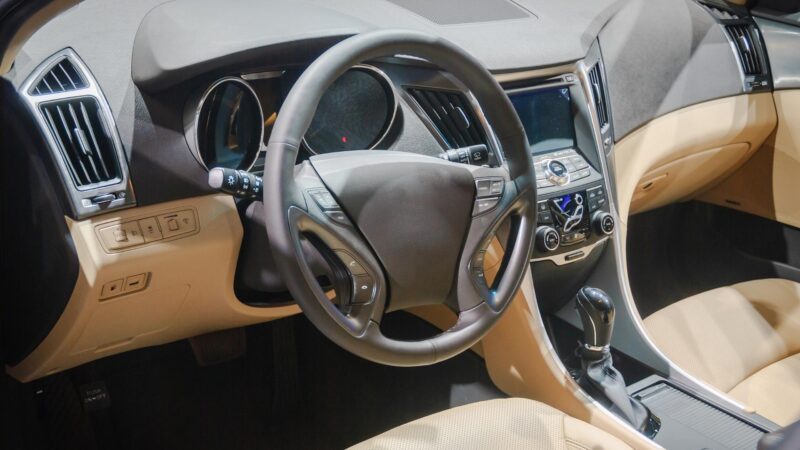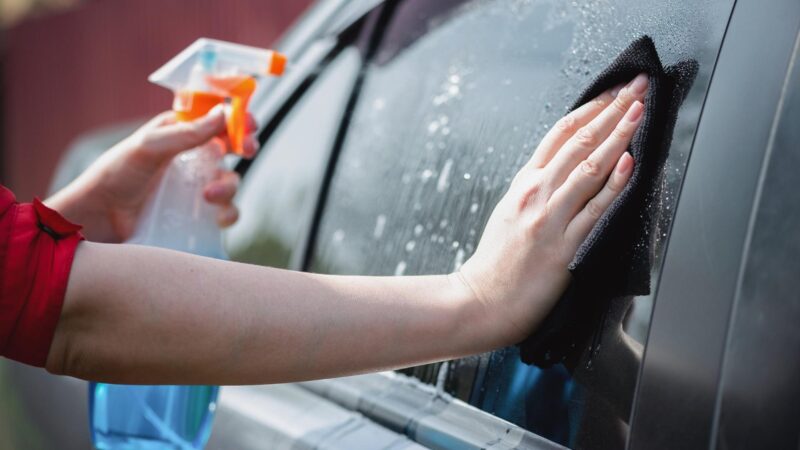Ants are very resourceful insects. They can easily find food and leave trail pheromones so their comrades can follow them and bring food back to their colony. No wonder they can also attack your car. In most cases, you will notice marching ants leading somewhere, which can be a problem if ignored.
Getting rid of ants inside a car depends on a lot of factors. This includes the type of ants found, where they are found, and the severity of the problem. In most cases, setting ant baits and natural methods can solve the problem. In extreme cases, a professional exterminator is necessary.
As we all know, ants don’t work alone. They can be seen almost anywhere, including inside a car. Most ant species are harmless, but some have very painful bites, like fire ants and carpenter ants. After reading this article, you will learn why ants enter a car, how to get rid of them, and some key preventive measures.
Table of Contents
Why Are Ants Attracted to Your Car?

Ants are attracted to your car because they sense some sweet food or sugary drinks. Like other insects, ants can detect chemical substances using their olfactory receptors. In fact, they can smell food better than humans. A study suggested that ants can also smell 4-5 times better than many other insects.
Ants are also attracted to moisture and human sweat since it contains glucose (simple sugar) and small amounts of salt. Surprisingly, ants are more attracted to salt than sugar if the amount is small. They are likely to enter your car during hot weather and your aircon is not working, or if you leave your dirty clothes inside.
Meanwhile, grease ants (Solenopsis molesta) are attracted to grease, hence the name. As we all know, grease is common lubrication in cars. And although your car may be clean and has no food source, some ants may still accidentally enter your car. This can happen once you park your car near an ant-infested area.
Where Do Ants Hide in Cars?
Ants are not scared of people. But then, they will tend to escape or fight back when threatened. Nonetheless, these tiny crawlers may hide to avoid extreme temperatures. Cars also have a lot of dark and small crawling spaces where ants can hide and seek food and shelter. Here are some of them:
- Air conditioning unit (A/C)
- Car engine
- Center console
- Dashboard
- Glove compartment
- Spare tire
- Upholstery
- Under the seats
- Underneath floor mats
Places to Check and Treat for Ants in Your Car
Ants don’t feel fear, and they are not afraid of humans. Since they don’t mind being exposed, you can find them everywhere. If you spot ants marching in and out of your car, it means that they have been collecting some food debris and bringing them to their nest. Meanwhile, some ants are in hidden and dark areas.
The best places to check for ants in your car are the interior trims. These parts of your car are more decorative than functional and make you feel comfortable and safe. This includes the dashboard, floor carpets, door panel, steering wheel cover, air conditioner, stereo, cup holder, upholstery, and storage compartment.
Why Are There Ants on the Outside of My Car?

There are three possible reasons why ants are on the outside of your car. First, you may have parked your car near their nest or colony. Second, ants found a food source on the body or roof of your car. Third, some ants may have already entered your car, and the ones you saw are going back and forth to their colony.
How to Get Rid of Ants in Car Engine?
Ants are unlikely to nest in your car engine if it is properly sealed. On the other hand, they are attracted to sweet smell of antifreeze. Therefore, ants are likely to invade your car engine if there is an antifreeze leak. Needless to say, this can also lead to accidents. Here are some tips to get rid of ants in your car engine:
- Check for blue smoke coming out from the hood while you are driving or a strong burning smell, while the engine is running
- If antifreeze reservoir is damaged, replace it at once.
- Check for loose caps and tighten them properly. Replace if necessary.
- Once you fix the leak, wait until the ants will go away.
- Alternatively, properly cover the engine control unit, electrical components, and other sensitive parts of your car engine.
- Spray a tough degreaser such as Chemical Guys Orange Degreaser throughout your car engine. This will remove the ants but may not kill them all.
- Heavy-duty degreaser – Cuts through grease, grime & oil fast
- Multi-surface cleaner – Ideal for engines, tires, tools & more
- Professional-strength formula – Tackles the toughest messes
- Works fast – Rapidly dissolves stubborn contaminants
- Versatile use – Perfect for automotive, garage & industrial...
- If necessary, scrub the areas where there is thick grease. Use a non-metallic brush.
- Rinse the engine using a standard garden hose to wash away the degreaser and the ants. Make sure that the sensitive parts are still properly covered.
- Dry the engine using a clean cloth or air compressor.
- If you cannot fix the problem yourself, consult a mechanic.
How to Deal With Ants in Your Car?
Dealing with ants in cars is not done by simply removing them. Note that ants are social insects, and it is very rare that you see only one or two ants in your car. They may also enter clean cars. Some ant species have venom or bite humans very painfully. Therefore, here are some tips on how to deal with ants in cars:
- Identify the type of ants. Unlike most ants that don’t bite, fire ants are very aggressive and sting humans. On the other hand, crazy ants don’t form a line.
- Trace their nest. Worker ants bring food to their nest, where you can find their colony and queen.
- Check where you park your car. If it is near an anthill, you can expect that this is where ants are coming from.
- Choose the right bait and pesticides. Some ant baits are not effective against specific ant species, while some pesticides are harmful to carpets and car seats.
- In worse cases, you may need the help of a car service center.
How to Get Sugar Ants Out of Your Car?
As the name implies, sugar ants (Tapinoma sessile) are ants that are attracted to sources of sweets. Therefore, they will invade your car if you leave chocolate and candy wrappers, sweet fruits, and pet food. Sugar ants are also called odorous house ants or stink ants because they leave a foul smell once you crush them.
Sugar ants are also attracted to moisture and feed on other insects, but they don’t eat each other. Although they may bite humans, their bites are generally harmless. These sweet-eating ants are fast movers, but they travel in piles. They are also easy to control. Here are some ways to get rid of sugar ants in cars:
- Clean every corner of your car interior thoroughly using a wet and dry vacuum cleaner.
- Use cotton swabs or cloth dipped in warm water and soap to clean coffee, soda, and other sticky spills. If possible, remove cup holders so you can clean them better.
- Throw away all garbage, including food wrappers and leftover food.
- Remove stains on seats and carpets using a mixture of water, vinegar, and soap.
- For stubborn stains, you can try Tuff Stuff Car Cleaner and Stain Remover.
- HEAVY-DUTY CLEANING: Handles stains with deep cleaning foaming...
- BRISTLED CAP: Unique design helps work in the foaming formula for...
- MULTI-PURPOSE: Use in the car, at home, or in your garage
- SCIENTIFICALLY ENGINEERED: The perfect formula for all of your...
- EXPERT CAR CARE: Specially designed to make it faster and easier...
- To bait ants, mix boric acid with sugar and water into a small bowl or cotton ball. Since boric acid is a slow-acting poison, worker ants will bring the food to their colony. Hence, their queen will also eat it and die.
- For better and faster results, use TERRO T300B Liquid Ant Killer to bait sugar ants and other species except for crazy ants.
- FAST-ACTING: Noticeable ant activity reduction within days as...
- VERSATILE HOME PLACEMENT: TERRO ant traps are ideal for use along...
- READY TO USE: Simply place ant baits indoors with no setup...
- KILLS THE ANTS YOU DON'T SEE: TERRO ant bait is designed to share...
- ATTRACTS & KILLS: TERRO liquid ant baits indoor effectively...
How to Get Rid of Crazy Ants in My Car?
Unlike other ant species that dig burrows to build their nest, crazy ants prefer nesting in areas that have small holes. This is why they are mostly seen inside electronic and electrical circuits, including in cars. As the name suggests, they move fast and in an unpredicted pattern. Crazy ant bites are not painful, though.
Like longhorn crazy ants, tawny crazy ants (Nylanderia fulva) are harmless to humans. Both species don’t travel in a straight line. But so far, the only pesticide against crazy ants approved by the EPA (U.S. Environmental Protection Agency) is fipronil (Termidor SC), which is only available to professional exterminators.
Also called Rasberry crazy ants, tawny crazy ants have multiple queens for each colony. They don’t have a centralized nest, and their nests are usually under objects with excess moisture. These rice-grain-size ants are also not attracted to ordinary ant baits. With that, here are some tips to get rid of crazy ants in cars.
- Remove all infested electrical and electronic systems from your car.
- Place them in a small area where ants cannot spread out far.
- To kill the ants, use a handy but powerful air duster such as Sin Shine Multi-Use Electric Air Duster.
- Multi-use – Our SIN SHINE electric air blower can be used for...
- Alternative to Compressed Air – Inexpensive and nontoxic .you...
- Powerful and effective - Our dust blower can blow at 27m/s and...
- Handy Design & Simple Operation – having an extra-long 10-foot...
- Satisfaction guaranteed – Buying on Amazon is a easy job that...
- Since not all ants will get killed, sprinkle Food-grade Diatomaceous Earth (DE) in areas where there are still ants.
- Natural Product - Composed of 4lbs of 100% ground freshwater...
- OMRI Listed - Listed with the Organic Minerals Research...
- Powder Duster Included - Powder duster in the bag for easy and...
- Supports a Great Cause - Harris donates a portion of profits to...
- Made in the USA – Mined in Nevada and packaged in Georgia
- If the package does not include a powder duster, you can use ASPECTEK Ant Killer Powder Duster).
- SAFELY DISPENSE POWDER OR BAITS:Our Powder Duster is more durable...
- IMPROVED DUSTER SHAPE: The improved shape of our powder sprayer...
- PRECISE APPLICATOR: The insect powder duster is designed for...
- HIGH QUALITY MATERIAL: The bulb, tip, and extension of powder...
- EASY TO USE BULB: Easy to use, easy compression, for use in a...
- If the crazy ant infestation is severe, contact a licensed exterminator.
Can You Bug Bomb a Car for Ants?
You can use a bug bomb to kill ants in your car. One effective fogger is the Raid Concentrated Deep Reach Fogger, which is designed to kill flying and crawling insects, including ants. This product can also penetrate cracks and crevices, leaves no residue, and should be used in spaces bigger than 5 x 5 feet.
- Concentrated for heavy bug infestations
- Penetrates deep to kill hidden roaches and fleas in your home
- Won’t leave a wet, messy residue
- One 2.1 ounce can treats a room up to 25’x35’ with 8’...
- Kills Ants, Black Carpet Beetles, Crickets, Earwigs, Fleas,...
Bug bombs kill insects by releasing airborne pesticides upwards and throughout the target space. Also known as total release foggers, bug bombs are released in a very fast manner. However, using a bug bomb for ants in cars is not always a good idea. This method is not always effective, and it comes with several issues.
First of all, not all ants will be killed. Some ants can escape and hide where bug bombs cannot reach. This is because only a small amount of aerosol droplets reach tiny spaces. Second, bug bombs can cause a fire if not used properly. With that, consult your car distributor or a professional pest control before using them.
What Smell Do Ants Hate?

Ants have a very strong sense of smell, and most species can smell foods as far as 10.8 ft (3.3 m) away. They can also smell scents that are too strong for them. Interestingly, most of these scents are common household products and are readily available. So, without further ado, here are some scents that ants hate:
- Chalk and baby powder
- Coffee grounds
- Vinegar
- Garlic
- Citrus peels
- Cucumber peels
- Essential oils such as cinnamon, clove, and peppermint
Homemade and Natural Solutions to Get Rid of Ants in Cars
In cases when the ants inside your car are only a few, you can handle them without the need for a professional exterminator. Oftentimes, you also don’t need to buy insecticides, which can be harmful to you and your precious car. There are natural but effective solutions to get rid of ants to choose from. Here are some of them:
1. Chalk
Chalk (and baby powder) contains calcium carbonate, which temporarily disrupts the ant’s activity in following scent trails left by other ants. Using chalk, draw a thick line around the infested area to avoid other ants from joining them. But again, chalk alone cannot kill the ants, and this solution is not permanent.
2. Coffee Grounds
Ants, except fire ants, hate the potent smell of freshly brewed coffee grounds. But like chalk, coffee grounds are also only a temporary ant-repellent. Once they lose their potency, ants will simply walk on them. The key here is to replace coffee grounds over and over again while thinking of the next possible solution.
3. White Vinegar Solution
Mix one part of water with one part of water. You may use the mixture as a spray or dip a piece of cloth on it and wipe the ants off. The white vinegar solution will not kill ants but has a longer-lasting effect than chalk and coffee grounds. But unlike them, vinegar has acid that can be corrosive and may harm electronic products.
4. Garlic
Garlic has a very intense smell that ants hate. Simply get some peeled fresh garlic and place them where the ants are present. Like the ones mentioned earlier, this cooking ingredient cannot kill ants but repels them effectively. Garlic does not cause damage to electronics, but you should replace them frequently.
5. Essential Oils
Some essential oils are effective ant repellents since they interfere with the insect’s pheromone trails. This includes peppermint essential oil, clove essential oil, and lemon eucalyptus essential oil. To work effectively, these essential oils should be diluted in water. But be careful; they can be toxic to people when ingested.
6. Use Boric Acid
Boric acid, which is different from borax, is very toxic to ants and can kill them. But since ants will not eat it, you should mix it with sugar or peanut butter to produce ant bait. But while boric acid is generally safe for humans due to its low toxicity, it can cause poisoning if swallowed, especially by small children and pets.
7. Use Baking Soda
Baking soda kills ants within minutes once it hits their stomach. Scientifically known as sodium bicarbonate, baking soda is odorless, and ants are very unlikely to eat them. For better results, mix it thoroughly with sugar before offering it to the ants in your car. However, not all ants may eat the mixture.
8. Diatomaceous Earth
Diatomaceous earth (DE) is an all-natural insecticide that kills ants in contact. As compared to ant bait, DE has no poison, but ants don’t need to eat it to die. It kills ants by penetrating their exoskeleton (hard external shell), causing them to die of dehydration. But unfortunately, the effect can be 16-24 hours or even longer.
9. Soap and Water
Dishwashing soap and water also repel ants and sometimes can kill them, too. Ants don’t swim, but they can float in water. But because their bodies are too small, they will eventually die of drowning. Soap may not kill them at once but will disrupt their normal activities. Soapy water also does not leave toxic residue.
10. Boiling Water
Boiling water is probably the fastest way to kill ants naturally. Its efficacy against ants is around 60 percent. If there are a lot of ants, you may need to pour boiling water repeatedly. To be more effective, mix it with essential oils or any kind of soap. Don’t use it in sensitive areas of your car, and avoid getting burned.
Related: Poison Ants DIY | Information and Control Guide
How to Kill Ants in Your Car?

As mentioned above, there are a lot of ways to eradicate the ants that entered your car. But while all of them are effective, not all of them are always applicable. The key here is patience and understanding what kind of ants you are dealing with. To sum it up, here are the different ways to kill ants inside your car:
- Trace their path to locate their colony.
- Spray soapy water.
- Sprinkle diatomaceous earth.
- Pour boiling water.
- Park your car under the sun. Turn on the engine and heater for quite some time. Ants may start to die when the temperature reaches 95°F (35°C).
- Use homemade ant baits such as baking soda (or boric acid) with sugar.
- Use commercial ant bait killers.
How to Prevent Ants Coming Back Into Your Car?
Ants are persistent pests and are very organized. They are also very small and vehicles have a lot of entry points, which you cannot seal entirely. So even if you have killed them all, another army of ants may soon be present. Therefore, here are some simple but effective ways to prevent ants from invading your car:
- Vacuum your car regularly, and make sure there are no food crumbs or wrappers left in hidden areas.
- In case of a liquid spill, wipe it dry as soon as possible. Note that ants are also attracted to excess moisture.
- Clean the body of your car regularly, including the glass part and tires. Make sure it is completely dry after a car wash or when you drive through heavy rains.
- Be aware of where you park your car. Make sure there are no anthills nearby, including in your garage.
- Drive your car at least thrice a week. Seldom-used cars may have fallen debris that attracts other insects. Ants also eat insects, dead or alive.
Ants are not pests; they only become one once they invade our space. These active creatures don’t get tired of seeking food for their colony. Again, ants are only very likely to stay in your car if there is a food source. As a responsible car owner, you should always keep it clean, dry, and safe from intruders.






